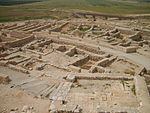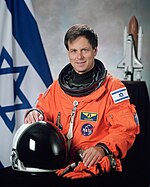Beersheba or Beer Sheva, officially Be'er-Sheva (Hebrew: בְּאֵר שֶׁבַע, romanized: Bəʾēr Ševaʿ, IPA: [ˈbe(ʔ)eʁ ˈʃeva(ʕ)] ; Arabic: بئر السبع, romanized: Biʾr as-Sabʿ, lit. 'Well of the Oath or Well of the Seven'), is the largest city in the Negev desert of southern Israel. Often referred to as the "Capital of the Negev", it is the centre of the fourth-most populous metropolitan area in Israel, the eighth-most populous Israeli city with a population of 211,251, and the second-largest city in the area (after Jerusalem), with a total area of 117,500 dunams (45 mi2 / 117.5 km2).
The Biblical site of Beersheba is Tel Be'er Sheva, lying some 4 km distant from the modern city, which was established at the start of the 20th century by the Ottoman Turks. The city was captured by the British-led Australian Light Horse in the Battle of Beersheba during World War I.
The population of the town was completely changed in 1948–49. Bir Seb'a (Arabic: بئر السبع), as it was then known, had been almost entirely Muslim and Christian, and was designated to be part of the Arab state in the 1947 United Nations Partition Plan for Palestine. In October 1948 it was captured by the Israel Defense Forces and the Arab population was expelled. Today, the metropolitan area is composed of approximately equal Jewish and Arab populations, but the population of the core area is almost exclusively Jewish with a large portion of the population made up of the descendants of Sephardi Jews and Mizrahi Jews who were expelled from Arab countries after 1948 as well as smaller communities of Bene Israel and Cochin Jews from India. Second and third waves of immigration have taken place since 1990, bringing Russian-speaking immigrants from the former Soviet Union as well as Beta Israel immigrants from Ethiopia. The Soviet immigrants have made the game of chess a major sport in Beersheba, and it is now Israel's national chess center, with more chess grandmasters per capita than any other city in the world.Beersheba is home to Ben-Gurion University of the Negev. This city also serves as a center for Israel's high-tech and developing technology industry.The city has constructed over 250 roundabouts, earning its moniker as the "Roundabouts Capital of the Israel" and the largest number of roundabouts in the world.










